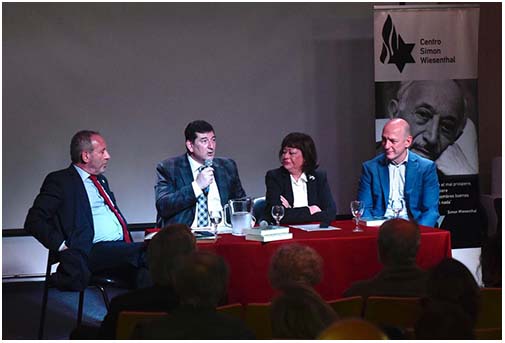SWC Commemorates Centenary of the 'Tragic Week', a Pogrom in Buenos Aires
March 27, 2019
Buenos Aires, March 27, 2019
Between January 7 and 14, 1919, following a strong struggle of the workers for the recognition of their rights, a nationalist group from the Argentine elite, with the support of the police forces, took to the streets to unleash violence which resulted in approximately 1,200 deaths.
The attackers, identified the Communists with the Russians by the shadow of the Revolution and, understanding that many of the Jews came from Russia, went especially to the Jewish neighborhoods where they killed approximately 200 people, raped women and children and destroyed their shops. The Center commemorated this event with a round table at the Argentinian National Library, overflowing the capacity of the audience.

Photo L-R: Perina, Gelblung, Saenz Quesada, Berensztein
The historian María Sáenz Quesada referred to the historical context, the presence of xenophobia and identified the roots of hatred present later decades in which the Jew was identified as an enemy.
Political analyst Sergio Berensztein argued that history should never be considered linear. Just as an educated Germany gave birth to Nazism, in its origins, something else was expected from Argentina.
The Director of the General Archive, Emilio Perina, said that whenever the story referred to the Tragic Week, no one mentioned the killing of Jews and that what is denied and covered and not exorcised, returns to the surface. He also showed documentation that substantiated the claims that the Jewish community presented to President Yrigoyen about the victims.
Dr. Ariel Gelblung, Wiesenthal Center´s Representative for Latin America, who acted as moderator, concluded: "The Jews who arrived fleeing from Czarist Russia found themselves victims of a Pogrom in which they were identified with their victimizers. "
For further information, please contact Dr.Shimon Samuels at +336 09770158 or Dr. Ariel Gelblung at +54 9 11 49695365, join the Center on Facebook, www.facebook.com/simonwiesenthalcenter, or follow @simonwiesenthal for news updates sent direct to your Twitter feed.
The Simon Wiesenthal Center is one of the largest international Jewish human rights organizations with over 400,000 member families in the United States. It is an NGO at international agencies including the United Nations, UNESCO, the OSCE, the OAS, the Council of Europe and the Latin American Parliament (Parlatino).
###
Centro Simon Wiesenthal
Cabello 3872, PB "C" (C1425APR) - Buenos Aires - Argentina
+54 11 4802-1744
info@cswlatinoamerica.org
COMUNICADO DE PRENSA
Para difusión inmediata
El Centro Wiesenthal Conmemoró los 100 Años de La Semana Trágica, un Pogrom en Buenos Aires
uenos Aires, 27 de marzo de 2019
Entre el 7 y el 14 de enero de 1919, a raíz de una fuerte lucha de los trabajadores por el reconocimiento de sus derechos, un grupo nacionalista proveniente de la élite argentina, con apoyo de las fuerzas policiales salió a las calles desatando una violencia que resultó en aproximadamente 1.200 muertos y 5.000 heridos.
Los atacantes, identificando a los huelguistas con comunistas y a estos con los rusos por la proximidad de la Revolución de Octubre y entendiendo que muchos de los judíos venían de Rusia, se dirigieron especialmente a los barrios judíos donde mataron aproximadamente 200 personas, violaron mujeres y niños y destrozaron locales comerciales.
El Centro Wiesenthal conmemoró dicha efemérides con una mesa redonda en el ámbito de la Biblioteca Nacional, desbordando la capacidad del auditorio.


(De izq. a Der. Perina, Gelblung, Saenz Quesada, Berensztein)
La historiadora María Sáenz Quesada se refirió al contexto histórico, a la presencia de xenofobia e identificó la situación con “el huevo de la serpiente”, odio presente en las décadas posteriores en que se identificó al judío como enemigo.
El analista político Sergio Berensztein sostuvo que nunca la historia debe ser considerada lineal. Así como la culta Alemania dio origen al Nazismo, se esperaba otra cosa de una Argentina que abrió generosamente abrió sus puertas a la inmigración.
El Director del Archivo General de la Nación, Emilio Perina, dijo que siempre que la historia se refirió a la Semana Trágica, omitió la matanza de judíos y agregó que lo que se niega, se tapa y no se exorcisa, vuelve a la superficie. Mostró también documentación que acreditaba los reclamos detallados sobre las víctimas que la Comunidad Judía presentó al entonces Presidente Yrigoyen.
El Dr. Ariel Gelblung, Representante del Centro Wiesenthal para América Latina, quien obró de moderador del acto, concluyó: “Los judíos que llegaban huyendo de la Rusia Zarista se encontraron siendo víctimas de un Pogrom en el que se los identificaban con sus anteriores victimarios.”
Para más información, por favor contactarse con el Dr. Shimon Samuels al +336 09770158 o al Dr. Ariel Gelblung al +54911 49695365.
El Centro Simon Wiesenthal es una organización judía internacional de derechos humanos que cuenta con más de 400.000 miembros. Es miembro consultivo de las Naciones Unidas, la UNESCO, la OSCE, el Consejo de Europa, la OEA y el Parlamento Latinoamericano (PARLATINO)
- Regional Offices
- Los Angeles
- New York
- Midwest US
- Southern US
- Toronto
- Jerusalem
- Paris
- Buenos Aires

